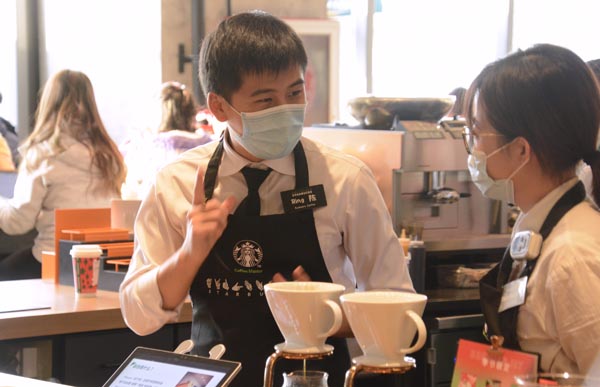 |
|
Chen Zizhong (left), a hearing-impaired barista working at the Starbucks Beijing Xitieying Wanda signing store, communicates with a colleague using sign language on Thursday. [Photo/Xinhua] |
Chen Zizhong, 27, clad in a brand-new black apron, won the coveted title of "coffee master" among his colleagues in Beijing's one and only Starbucks signing store.
The hearing-impaired barista works with a mix of hearing and hearing-impaired staff. The staff members refer to each other as "partners", which reflects the close bond that helps them during peak rush hours.
Starbucks has a total of six signing stores worldwide, which are made up equally of hearing and hearing-impaired staff. Among them, two are in the Chinese mainland. The Starbucks Beijing Xitieying Wanda signing store, where Chen landed his job, opened in September and is the first of its kind in Beijing.
Tackle problems head-on
Cabinets groaning with mugs and canvas sacks display souvenirs printed with images of hand signs and gestures, while a low cakes-and-pastries display case makes way for communication between baristas and customers in sign language. Display screens with order details always face the customers, and portable tablet computers with built-in voice assistance provide the hearing-impaired baristas with ease in face-to-face communication.
Flanking the counter, the corner for activities is decked out with soundproof foam to safeguard a relatively quiet environment for the hearing-impaired baristas.
However, the delicate designs of the cafe are quite hard to spot by a busy passerby. "When customers are wearing their masks and ask me for some napkins, misunderstandings can easily take place," Chen says. Those scenarios are where his hearing partners can step in and help.
Chen Fangqi, the cafe manager, has worked with Starbucks since 2009. "This is the quietest Starbucks I have ever encountered," she says, adding that she used to work in a cafe at the Beijing South Railway Station, among the busiest branches in Beijing.
The coffee shop in the railway station has a high volume of customers. The only hearing-impaired employee spends his shift preparing drinks in order to avoid possible issues communicating with customers.
"Our interpretation of equality is not about lowering our standards to favor the minorities, but offering equal job opportunities and upward mobility for impaired citizens," says the manager.
No compromise in standards means an uphill struggle. Copying the same drink recipe dozens of times from their dog-eared notebooks patched up with tape is commonplace for hearing-impaired baristas as it is the most efficient way for them to learn.
It will not be easy for Chen Zizhong to qualify as a coffee master.
Basic knowledge of various coffee beans sold in the store and day-to-day practices to make pour-over coffee are only snags, but hosting coffee lectures with customers face to face can be a daunting task.
Chen used to spend his days in a 9-to-5 job hunched over a desk, but feeling the absence of human interaction, he applied for a new career with Starbucks.
"After years working with screens, I'd like to move onto something that brings me (in a) face-to-face interaction to help improve my speaking ability," he says. "Though it can be hard for me, I want equality for everyone."